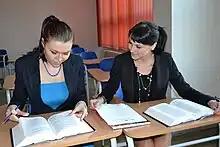Legal clinic
A legal clinic (also law clinic or law school clinic) is a legal aid or law school program providing services to various clients and often hands-on-legal experience to law school students. Clinics are usually directed by clinical professors.[1] Legal clinics typically do pro bono work in a particular area, providing free legal services to clients.

| Legal education in the United States |
|---|
 |
| Stages |
| Exams and licensure |
| Organizations |
Legal clinics originated as a method of practical teaching of law school students, but today they encompass also free legal aid with no academic links.[2] There are practice-based law clinics with no academic link which provide hands-on skills to lawyers, judges and non-lawyers on practical ethical dimensions of the law at the same time offer free public defence legal services.[3]
Need and importance
According to Avani Bansal, in cases where parties cannot afford a lawyer and are provided legal services by the state, the quality of that legal representation is often questionable. Therefore the need for clinical legal education, or establishing legal aid clinics at law schools, where law students can provide legal advice to indigent people.[4]
Goals, objectives and methods
Students typically provide assistance with research, drafting legal arguments, and meeting with clients. In many cases, one of the clinic's professors will show up for oral argument before the Court. However, many jurisdictions have "student practice" rules that allow law-clinic students to appear and argue in court.[5][6]
Areas of service

Clinical legal studies exist in diverse areas such as immigration law, environmental law, intellectual property, housing, criminal defense, criminal prosecution, American Indian law, human rights and international criminal law.[7] Clinics sometimes sue big companies and government entities, which has led to pushback in courts and legislatures, including attempts to put limits on whom clinics can sue without losing state subsidies.[8]
Obstacles
While many jurisdictions have "student practice" rules that allow law-clinic students to appear and argue in court,[5] in some countries like India law students are still studying at law schools and cannot represent the clients in courts by themselves.[4]
According to Avani Bansal in many law schools, clinical legal education is imparted without the support of practical component and lacks policy. Participation in many of these legal clinics lacks academic credits. Lack of resources, lack of trained faculty for the purpose, lack of involvement of Bar Council Members leads to ineffective and weak clinical legal education in countries like India. Communities around are not informed so are not involved. All these aspects frustrate the effective purpose of the Legal clinic in the sense that it neither trains students in practice nor it reaches to the public.[4]
Notable legal clinics
Netherlands
- Utrecht School of Law Clinical Programme on Conflict, Human Rights and International Justice
United States
Canada
- Assistance bureau in international law of University of Sherbrooke
References
- Black's Law Dictionary, 6th Edition, "clinical legal studies," (St. Paul, Minn: West Publishing Co., 1990), 254
- M. Yakasai, "Meaning of a Legal Clinic',2016
- "International Organizations". lextern. Retrieved 2019-10-18.
- Bansal, Avani. "Clinical legal education as a means to means to advance to advance access to justice in India". livelaw.in. livelaw.in. Retrieved 26 July 2017.
- "RuleXX.asp". www.lasc.org. Retrieved 2019-10-18.
- Uniform Local Rules Of The United States District Courts For The Eastern, Middle, And Western Districts Of Louisiana, LR83.2.13, "Local civil rule 83 - Rules by district courts; judges' directives". Archived from the original on 2008-07-03. Retrieved 2008-10-18.
- "404 - Universiteit Utrecht", University Utrecht School of Law Clinical Programme on Conflict, Human Rights and International Justice, retrieved March 16, 2017.
- Urbina, Ian (April 3, 2010). "School Law Clinics Face a Backlash". The New York Times. Retrieved 4 April 2010.
Bibliography
- Djemila Carron, Nesa Zimmermann & Vista Eskandari, "Pédagogies cliniques et critiques: penser les rapports de pouvoir dans l'enseignement du droit", Cliniques juridique 5, https://www.cliniques-juridiques.org/revue/volume-5-2021/pedagogies-cliniques-et-critiques-penser-les-rapports-de-pouvoir-dans-lenseignement-du-droit/
- Valériane Thool & Geneviève Dufour, "L’évaluation dans les cliniques juridiques : quelques réflexions sur l’appréciation de l’acquisition des compétences", Cliniques juridiques 6, https://www.cliniques-juridiques.org/revue/volume-6-2022/levaluation-dans-les-cliniques-juridiques-quelques-reflexions-sur-lappreciation-de-lacquisition-des-competences/